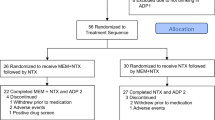Abstract
Rationale: Clinical studies have shown that the opioid antagonist naltrexone is effective in the treatment of alcoholism. However, the mechanism by which it produces this effect is not understood. Objective: This study was designed to investigate the effect of acute naltrexone on consumption of ethanol in healthy, non-problem social drinkers. Methods: Subjects (n=24) participated in an eight-session, within-subject, placebo-controlled choice procedure which measured ethanol preference and consumption. The procedure consisted of two blocks of four sessions in which subjects received either naltrexone (50 mg oral) or placebo 1 h before consuming an ethanol or placebo beverage. On the first two sessions of each block, subjects received a color-coded beverage containing ethanol (0.75 g/kg) or placebo, in five equal portions at 15-min intervals. On the next two sessions of each block, subjects chose which beverage they preferred (i.e., placebo or ethanol) and how much they wished to take, in unit doses (placebo or ethanol 0.15 g/kg/dose). The primary behavioral measures were (1) the number of times subjects chose ethanol over placebo, and (2) the number of doses they consumed. Subjects rated their mood states and subjective drug effects at regular intervals during each session. Results: Naltrexone did not alter the frequency of ethanol (versus placebo) choice. Although naltrexone did decrease the total number of ethanol doses subjects took (mean 2.7 doses after naltrexone; 3.4 doses after placebo), it also decreased the number of placebo ”doses” subjects took on sessions when they chose the placebo beverage (mean 1.6 placebo doses after naltrexone; 2.8 doses after placebo). Ethanol produced its prototypic subjective effects (e.g., increased ratings of ”feel drug”, ”like drug” and ”high”), and these effects were not altered by naltrexone. Naltrexone produced mild sedative-like effects, and several subjects reported adverse effects such as nausea. Conclusions: These findings show that naltrexone reduces ethanol consumption in healthy volunteers, as it does in alcoholics. However, this reduction was not specific to alcohol; subjects also consumed less of a non-alcoholic, placebo beverage. These findings suggest that naltrexone may reduce alcohol consumption by a non-specific mechanism.
Similar content being viewed by others
Author information
Authors and Affiliations
Additional information
Received: 17 September 1998 / Final version: 14 April 1999
Rights and permissions
About this article
Cite this article
de Wit, H., Svenson, J. & York, A. Non-specific effect of naltrexone on ethanol consumption in social drinkers. Psychopharmacology 146, 33–41 (1999). https://doi.org/10.1007/s002130051085
Issue Date:
DOI: https://doi.org/10.1007/s002130051085




